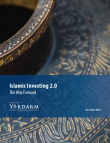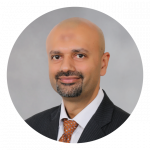Islamic Investing 2.0:
The Way Forward
Download a PDF:
Traditional Islamic-compliant mutual funds have served Muslim investors well in the four decades since the first was launched in Malaysia. By fostering partnership in shared risk and reward (musharaka), and by allowing investors to diversify their assets while avoiding haram activities — typically alcohol, tobacco, gaming, financial services, pork processing, and pornography — these original funds pioneered a form of responsible investing while also serving the unique needs of the Muslim community.
Forbidding what is wrong in one’s investments is one half of the requisites for hisbah (or the accountability Muslims have to uphold Sharia, Islam’s ethical and moral teachings) and has frequently created advantages for investors, particularly during times of economic disruption. We believe that Islamic-compliant mutual funds are well-positioned to weather market downturns due, in part, to their conservative approaches. During the 2008 Financial Crisis, and most recently in the COVID-19 related “crash” in March, Sharia-compliant screens helped funds avoid some of the worst-faring industries. In 2020, hotels, restaurants, leisure, airlines, and financial services have tended to do worse, due in part to negative consumer sentiment or because they carried a high debt load. Airlines, for example, tend to carry a high percentage of debt and therefore don’t meet Sharia-compliant financial screens. Banking is similarly excluded by Islamic screens on account of the industry’s involvement in lending and interest. Between the recent sell-off of financial stocks (as investors feared potential damage from missed loan payments) and the extreme decline in air travel since March, Sharia-compliant funds have been largely shielded from these losses.
You are the best community ever raised for humanity—you encourage good, forbid evil, and believe in Allah ... (Quran 3:110).
The hospitality industry has also suffered tremendously during the pandemic with many stocks booking their highest losses in history, falling an average of 22% more than the S&P 500. But hospitality, too, is typically excluded from Islamic portfolios due to its inability to pass the haram (forbidden) revenue threshold of 5%. By avoiding exposure to the revenue streams that come from alcohol or gambling, Islamic-compliant funds have been insulated from the hotel, cruise line, and restaurant industries as well.
The exclusion of specific industries within an investment portfolio is a process known as negative screening, and it’s not just Muslim investors who have benefited from avoiding these “sin stocks.” In fact, the negative screening processes that are used among socially responsible investing (SRI) strategies have been practiced in various forms within the United States since the 18th century, originating among Christian denominations such as the Methodists and Quakers who sought to avoid investments in the slave trade, alcohol, tobacco, and gaming. It wasn’t until the 2010s that SRI began to catch on among mainstream investors, and the new familiarity with SRI strategies grew in tandem with the increase in environmental, social, and governance (ESG) data available to investors. When ESG data is considered alongside financial analysis in the investment process, it’s known as ESG Integration. Simultaneously, SRI has evolved to include more nuanced forms of investing, and now frequently stands for “sustainable, responsible, and impact investing.”
Just as negative screening allows investors to exclude haram activities from their portfolios, positive screening allows asset managers to use ESG data to identify companies with strong values and a positive social and/or environmental impact.
If forbidding what is wrong in one’s investments is only half of one’s duties, it follows that Muslim investors should also seek to enjoin good, as the verse of the Quran states. Just as negative screening allows investors to exclude haram activities from their portfolios, positive screening allows asset managers to use ESG data to identify companies with strong values and a positive social and/or environmental impact. Incorporation of ESG data into the investment process gives asset managers a deeper understanding of an issuing company’s priorities and behavior, and may give clues as to how the investment will perform in the future — and, just as negative screening has shielded investors from myriad scandals, usually coming to light in downturns, research shows that investments in companies that perform well on ESG measures can be equally beneficial by reducing risk within an investment portfolio.
There are clear ties between many ESG issues and the Quran/Hadith
In a recent report titled “Moving Beyond Exclusion: Sustainable Investing and Performance,” the influential investment research organization Morningstar states that with higher-quality ESG data now available to analysts, research has shown “a number of positive relationships between companies that employ best practices addressing the ESG factors that face their business — whether measured in terms of financial results or stock price.”1 The report also notes that Morningstar’s research “suggests that funds with a focus on ESG inclusion, where an investor uses E, S, and G criteria in their selection process, tend to outperform more often than they underperform … if anything, sustainable funds and portfolios perform slightly better than the conventional ones.” In May 2020, S&P Global Market Intelligence noted that funds that include ESG criteria “remain relative safe havens in the economic downturn caused by the coronavirus pandemic, supporting claims by ESG investors that their focus … leads to more resilient portfolios.”2 Like Morningstar, Morgan Stanley has undertaken substantial research of ESG and sustainable investing, and recently published results from a late 2019 survey of 110 asset owners including financial institutions, insurers, and pension funds. Of these respondents, 80% reported believing that companies with strong ESG practices may make better long-term investments and 57% “envision a time when they will allocate solely to investment managers with a formal ESG approach.”3
As research into the performance of ESG investing advances, Muslim investors can consider what benefits may come from the protection of Islamic negative screening and the added due diligence that comes with positive ESG screening. What’s more, there are clear ties between many ESG issues and the Quran/Hadith. Water management, an environmental concern, is addressed in the Hadith collection of Ibn Majah, when the Messenger of Allah saw a man performing ablution and said to him, “Do not be extravagant.” When the man asked, “Can there be any extravagance in ablution?” the Messenger said, “Yes, even if you are on the bank of a flowing river.”4 Intel Corporation, the world’s largest manufacturer of semiconductor chips, uses around nine billion gallons of water per year to cool their factories.5 This volume of water creates a great strain on the environments in which Intel operates its factories and requires both sustainability-focused and Muslim investors to consider whether there is extravagance, and whether Intel can be doing better.
A lesson from the Sirah (Prophetic biography) literature shows that Muslim investors should be attuned to social issues such as fair labor practices and animal cruelty. For example, as the Muslim army traveled through the narrow valley of Al-‘Arj on their way to the opening of Makkah, the Prophet (pbuh) noticed a dog nursing her pups in the middle of a narrow section of the road. The Prophet (pbuh) assigned one of his men to guard the dog as the army made its way through the valley so that she would not be disturbed.6 It is related that later, “When we stopped at a halt, we did not say our prayers until we had taken the burdens off our camels’ backs and attended to their needs.”7 Knowing that the camels labored on behalf of the traveling army, the army prioritized their well-being — just as responsible companies do for their employees.
Corporate governance is also focused on evaluating business ethics, a subject that has become a cornerstone of modern business school curriculum, and for which Islam provides a clear model.
While environmental and social issues often receive more media coverage than governance issues, it’s corporate governance that professional investors have long looked to for an indication of a company’s health and viability. Topics like CEO compensation, board diversity, and risk management all help to paint a picture of a company’s quality of operations. Corporate governance is also focused on evaluating business ethics, a subject that has become a cornerstone of modern business school curriculum, and for which Islam provides a clear model.
|
HOW SATURNA’S SCORING PROCESS SUPPORTS ISLAMIC VALUES Many asset managers, research data providers, and ratings organizations have developed a variety of methods for rating company performance on environmental, social, and governance factors — but Saturna Capital’s proprietary ESG screening process is foremost rooted in Islamic principles. Saturna has collaborated with the Fiqh Council of North America (FCNA) to develop and refine our proprietary screening process and we work with a Sharia Advisor to ensure compliance. As the first Sharia-compliant asset manager in the US, we take great care to honor the principles of Islam within the context of modern finance, while also focusing on sustainability issues. Across the US, many Imams, Masjids, and faith-based non-profits have chosen to invest with Saturna — as well as many other non-Muslim but values-aligned individuals and organizations. Providing customers with quality products that allow them to invest according to their values is the factor which allows Saturna Capital to operate according to its own values. |
Before the Prophet Muhammad received his first revelations, he worked as a merchant, building a reputation as truthful, trustworthy, and honest. His reputation impressed Khadijah, a successful businesswoman who hired him to trade on her behalf. Upon returning from his first trip for Khadijah, the servant who accompanied Muhammad reported that Muhammad’s exemplary and honorable approach to business resulted in him bringing back “twice as much profit as Khadijah had expected.”8 Upstanding ethical behavior and transparency in business help secure a profitable future. Prudence and sustainability also play a role in any business’s ongoing success; when the Prophet Joseph interpreted the King’s dream that there would be seven years of abundance and seven years of drought, he saved the grain of the state during the years of abundance. When the years of drought came, Joseph then had enough in the granary to distribute to the people. Joseph’s prudence in this way parallels responsible and sustainable financial management.
“Focusing on best in class ESG practices in an industry or category, rather than just exclusion, leads to much better results.”
One of the purposes of Sharia is to protect wealth, and just as Sharia-compliant screens are a form of risk management — protection — so too are ESG and sustainability considerations. It’s time for Muslim investors to move toward Islamic Investing 2.0: by combining both negative screening (forbidding evil) and the positive screening that integrates ESG considerations (enjoining good), Muslims will be better able to express their faith through their investments. This strategy may also serve investors with improved performance as well; Morningstar’s research confirms that “focusing on best in class ESG practices in an industry or category, rather than just exclusion, leads to much better results.”
Glossary
Definitions of terms we use throughout this paper:
ESG: Environmental, Social, and Governance. Describes the criteria and data investors can use to evaluate an investment’s performance among these three aspects.
ESG Integration: An investment process in which ESG criteria and data is considered alongside traditional financial analysis.
Fiqh: Islamic jurisprudence, or the human understanding of the Islamic law revealed in the Quran and Sunnah.
Halal: Lawful or permitted in Islam.
Haram: Unlawful or forbidden in Islam.
Hisbah: Accountability, or the duty to uphold the beliefs of Sharia.
Musharaka: A joint enterprise in which profits and losses are shared among all business partners.
Negative Screening: An investment process in which the portfolio manager excludes – or screens out – specific industries when investing, such as tobacco or fossil fuels.
Positive Screening: An investment process in which the portfolio manager seeks to include investments that perform better than their peers on specific ESG or financial measures.
Sharia, Shariah, Shari'ah, or Syriah: Islam’s ethical and moral teachings.
SRI: Socially responsible investing, or (alternately) sustainable, responsible, and impact investing. An investment strategy that considers both the financial performance of an investment as well as the investment’s performance on environmental and social factors.
Sirah/Seerah: Traditional biography of the Prophet Muhammad.
Sustainable Investing: Often used interchangeably with SRI; an investment strategy that considers both the financial performance of an investment as well as the investment’s performance on environmental and social factors.
Footnotes
1 Moving Beyond Exclusion: Sustainable Investing and Performance. Morningstar. https://www.morningstar.com/lp/beyond-exclusion
2 Clark, Robert, Michael Copley, and Esther Whieldon. ESG funds remain relative safe havens in coronavirus downturn. S & P Global, May 19 2020. https://www.spglobal.com/marketintelligence/en/news-insights/latest-news-headlines/esg-funds-remain-relative-safe-havens-in-coronavirus-downturn-58679570
3 7 Insights from Asset Owners on the Rise of Sustainable Investing. Morgan Stanley. https://www.morganstanley.com/ideas/sustainability-investing-institutional-assetowners
4 Hadith No: 424 From: Sunan Ibn Majah. Chapter 2, The Chapters of Purification and its Sunnah Narrated/Authority of Ibn Umar.
5 Intel Reduces Freshwater Use by 50% in Chandler, AZ. Business for Water Stewardship. https://businessforwater.org/stories/story-005#:~:text=Intel%20Corporation%2C%20headquartered%20in%20Santa,part%20of%20their%20business%20strategy.
6 Al-Kadi, A. (2013). Makkah To Madinah - A Photographic Journey of The Hijrah Route. Orient East.
7 Narrated by Anas. Awn (Ref. No. 32); 7:223; Hadith aNo. 5234.
8 Khadija bint Khuwaylid. Wikipedia, October 31, 2020. https://en.wikipedia.org/wiki/Khadija_bint_Khuwaylid
Important Disclaimers and Disclosures
This material is for general information only and is not a research report or commentary on any investment products offered by Saturna Capital. This material should not be construed as an offer to sell or the solicitation of an offer to buy any security in any jurisdiction where such an offer or solicitation would be illegal. To the extent that it includes references to securities, those references do not constitute a recommendation to buy, sell or hold such security, and the information may not be current. Accounts managed by Saturna Capital may or may not hold the securities discussed in this material.
We do not provide tax, accounting, or legal advice to our clients, and all investors are advised to consult with their tax, accounting, or legal advisers regarding any potential investment. Investors should not assume that investments in the securities and/or sectors described were or will be profitable. This document is prepared based on information Saturna Capital deems reliable; however, Saturna Capital does not warrant the accuracy or completeness of the information. Investors should consult with a financial adviser prior to making an investment decision. The views and information discussed in this commentary are at a specific point in time, are subject to change, and may not reflect the views of the firm as a whole.
All material presented in this publication, unless specifically indicated otherwise, is under copyright to Saturna. No part of this publication may be altered in any way, copied, or distributed without the prior express written permission of Saturna.
A Few Words About Risk
Investment share prices, yields, and total returns will change with market fluctuations as well as the fortunes of the countries, industries, and companies in which it invests. Foreign investing involves additional risks, including fluctuations in currency exchange rates, less public information about securities, less governmental market supervision and the lack of uniform financial, social, and political standards. Foreign investing heightens the risk of confiscatory taxation, seizure or nationalization of assets, establishment of currency controls, or adverse political or social developments that affect investments.
While diversification does not guarantee against a loss in a declining market, it can help minimize the risk of the decline of a single market.
About the Authors
Monem Salam MBA
Executive Vice President
Portfolio Manager
Stephanie Ashton MBA
Business Analyst
Manager of Corporate Social Responsibility




